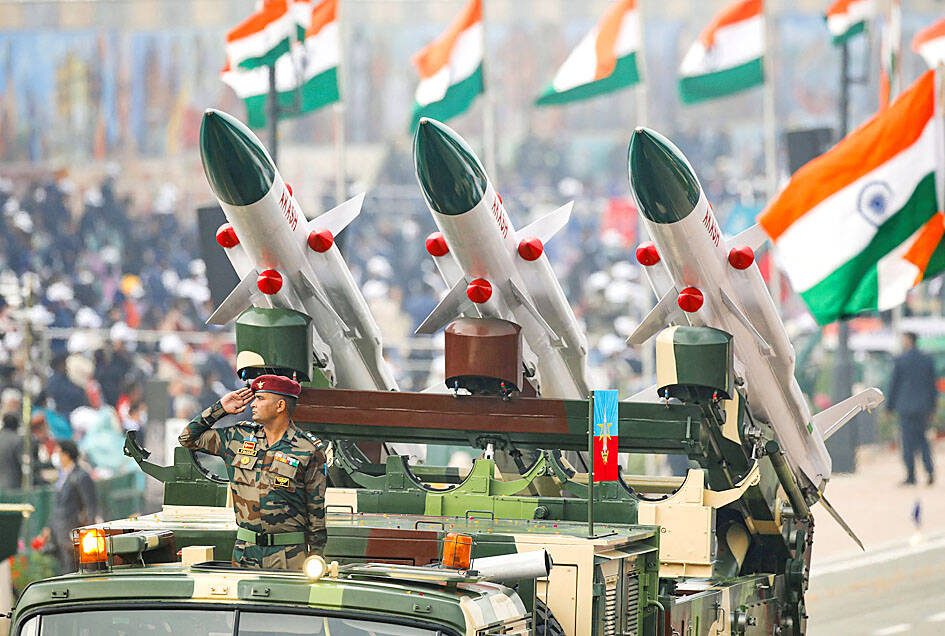New Delhi is to buy portable air-defense missiles to deploy along its border with China as militarization in the region gathers speed and hostilities between the two countries enter a third year.
The Defense Acquisition Council — headed by Indian Minister of Defense Rajnath Singh — cleared the purchase of the very short-range missiles that can be carried by troops, according to a statement issued late on Tuesday.
“In view of the recent developments along the northern borders, there is a need to focus on effective air defense weapon systems which are man portable and can be deployed quickly in rugged terrain,” the ministry said.

Photo: Reuters
Meant for neutralizing low-altitude aerial threats at close range, the missile is designed and developed by Indian research organization DRDO and is similar to US-made FIM-92 Stinger surface-to-air missiles.
Such defense missile systems have proved to be effective in recent conflicts and the Pentagon is providing at least 1,600 Stinger missile systems to Ukraine to fend off Russian air attacks.
Tensions along the Asian nations’ disputed border have simmered since a June 2020 clash — the worst in more than 40 years — left at least 20 Indian and at least four Chinese soldiers dead.
That fighting was centered around the Himalayan region of Ladakh, along their 3,488km border known as the Line of Actual Control.
Last month, troops clashed in the northeast Indian border state of Arunachal Pradesh.
Military commanders of the two nations have held 17 rounds of talks to attempt to defuse the border crisis, but progress has been glacial.
The ministry also cleared the purchase of locally made anti-tank missiles for helicopters and Brahmos anti-ship missiles for its warships.
The total cost of the military hardware would cost 42.76 billion rupees (US$523.7 million), but the ministry did not disclose the estimated price of each of the three items.

A Ministry of Foreign Affairs official yesterday said that a delegation that visited China for an APEC meeting did not receive any kind of treatment that downgraded Taiwan’s sovereignty. Department of International Organizations Director-General Jonathan Sun (孫儉元) said that he and a group of ministry officials visited Shenzhen, China, to attend the APEC Informal Senior Officials’ Meeting last month. The trip went “smoothly and safely” for all Taiwanese delegates, as the Chinese side arranged the trip in accordance with long-standing practices, Sun said at the ministry’s weekly briefing. The Taiwanese group did not encounter any political suppression, he said. Sun made the remarks when

The Taiwanese passport ranked 33rd in a global listing of passports by convenience this month, rising three places from last month’s ranking, but matching its position in January last year. The Henley Passport Index, an international ranking of passports by the number of designations its holder can travel to without a visa, showed that the Taiwan passport enables holders to travel to 139 countries and territories without a visa. Singapore’s passport was ranked the most powerful with visa-free access to 192 destinations out of 227, according to the index published on Tuesday by UK-based migration investment consultancy firm Henley and Partners. Japan’s and

BROAD AGREEMENT: The two are nearing a trade deal to reduce Taiwan’s tariff to 15% and a commitment for TSMC to build five more fabs, a ‘New York Times’ report said Taiwan and the US have reached a broad consensus on a trade deal, the Executive Yuan’s Office of Trade Negotiations said yesterday, after a report said that Washington is set to reduce Taiwan’s tariff rate to 15 percent. The New York Times on Monday reported that the two nations are nearing a trade deal to reduce Taiwan’s tariff rate to 15 percent and commit Taiwan Semiconductor Manufacturing Co (TSMC, 台積電) to building at least five more facilities in the US. “The agreement, which has been under negotiation for months, is being legally scrubbed and could be announced this month,” the paper said,

MIXED SOURCING: While Taiwan is expanding domestic production, it also sources munitions overseas, as some, like M855 rounds, are cheaper than locally made ones Taiwan and the US plan to jointly produce 155mm artillery shells, as the munition is in high demand due to the Ukraine-Russia war and should be useful in Taiwan’s self-defense, Armaments Bureau Director-General Lieutenant General Lin Wen-hsiang (林文祥) told lawmakers in Taipei yesterday. Lin was responding to questions about Taiwan’s partnership with allies in producing munitions at a meeting of the legislature’s Foreign Affairs and National Defense Committee. Given the intense demand for 155mm artillery shells in Ukraine’s defense against the Russian invasion, and in light of Taiwan’s own defensive needs, Taipei and Washington plan to jointly produce 155mm shells, said Lin,